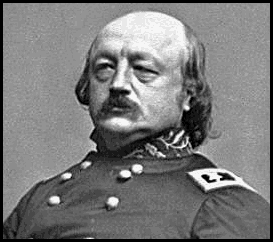
General Benjamin F. Butler, Federal Army
(1818-1893)
Benjamin Franklin Butler was born in Deerfield, New Hampshire, on November 5, 1818. He graduated from Waterville (now Colby) College in 1838, was admitted to the Massachusetts bar in 1840, and began practice in Lowell, Massachusetts. He was an astute lawyer, particularly in the field of criminal law. Entering politics as a Democrat, he was elected to the Massachusetts House of Representatives in 1853 and to the State Senate in 1859. He was a delegate to the Democratic national convention from 1848 to 1860. In the Democratic national convention of 1860 at Charleston, he supported the party movement that nominated Breckenridge and divided the Democratic Party. He was commissioned Brig. General of Massachusetts militia in April 1861 and Maj. General U.S. Volunteers in May 1861. He took command of the District of Annapolis in early 1861 and occupied Baltimore on May 13 without opposition. While in command at Fortress Monroe, he agreed to return a group of fugitive slaves to their owner on the condition that the owner, a Virginia colonel, take an oath of allegiance to the United States. In commenting on the decision the action was defended on the grounds that Negroes were "contraband of war," thus originating the phrase "contraband" as applied to Southern Negroes during the war. In the conduct of tactical operations Butler was almost uniformly unsuccessful; and his first action at Big Bethel, Virginia, was a humiliating defeat for the Union forces. In 1862 he was assigned command of the Federal force that occupied New Orleans. In the administration of that city he showed firmness and severity. He opposed the use of Negroes as troops in that area. Many of his acts, however, gave great offense, particularly his seizure of $800,000 which had been deposited in the office of the Dutch Consul which he claimed had been entrusted for purchasing war supplies and his notorious "Woman Order". He was nicknamed "Spoons" for allegedly stealing silverware. Butler showed indecision and lack of leadership while commanding forces near Fortress Monroe. He failed to threaten Richmond and to keep Lee busy and instead became bottled up at Bermuda Hundreds. Grant and Halleck wanted to retire him but were advised not to provoke party division on the eve of the presidential election of 1864. When Lincoln was reelected, Grant fired Butler; and Lincoln supported Grant's action. Discredited and bitter, Butler returned to Massachusetts. He died in Washington, D.C., on January 11, 1893.